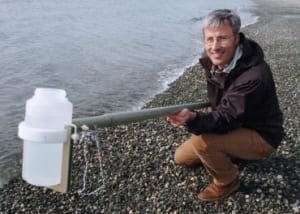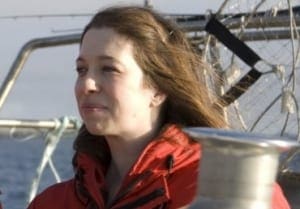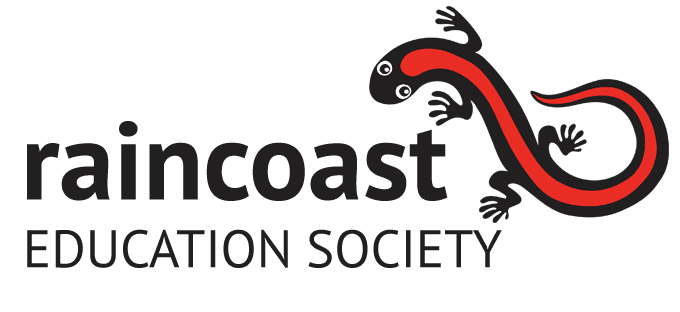2014 Raincoast Speaker Series

Dr. Jay Cullen
In February of this year, Citizen Scientists in Ucluelet collected a water sample that tested positive for very low levels of Cesium-134, the isotope used to track Fukushima-based radiation. This finding brought global media attention to our coastal waters, but has left many people with questions about the health and safety of our coast.
In this presentation, Dr. Jay Cullen will update our community on the radioactive releases, transport from Fukushima, and expected maximum concentrations on the west coast of North America. Dr. Cullen will discuss potential concerns about and impacts on environmental and public health, and the ongoing monitoring efforts in Tofino, Ucluelet and throughout the Pacific North West.
Dr. Jay T. Cullen took his BSc (Honours) in Biology from McGill University and PhD in Chemical Oceanography from Rutgers University. After a postdoctoral scholarship at Woods Hole Oceanographic Institution in Massachusetts he has been at the University of Victoria in BC, Canada since 2003 where he is an Associate Professor in the School of Earth and Ocean Sciences. Dr. Cullen is the lead scientist of The InFORM Network (Integrated Fukushima Ocean Radionuclide Monitoring), a new marine radioactivity monitoring network that engages scientists in Canada and the US, health experts, non-governmental organizations, and citizen scientists along the Pacific coast.

Dr Caroline Fox
Along the Pacific coast of North America, ancient relationships between bears and salmon result in the transport of salmon carcasses, nutrients and energy into coastal forests. Salmon-bear interactions fundamentally modify many coastal systems, but these interactions do not occur in isolation.
In spring, black bears emerge from hibernation and leave their dens to search the lands and shorelines for nourishment. Spawning in mass aggregations against the shore, Pacific herring, the dominant forage fish in BC, cover intertidal and subtidal zones with layers of eggs. Highly mobile and opportunistic, black bears exploit lipid-rich herring eggs in a springtime feast that can last for over a month.
Come learn about previously undocumented relationships between black bears and Pacific herring, a declining species of marine ecosystems. Alongside images of wildlife captured by remote cameras and aerial photography of herring spawns, this talk underscores what many people living on this coast already know; that Pacific herring are both poorly understood and vitally important to coastal ecosystems.
Dr. Caroline Fox is a conservation scientist and postdoctoral fellow with Raincoast Conservation Foundation and the Department of Geography at the University of Victoria. Her research interests revolve around marine-terrestrial interactions, marine predator ecology and the study of human impacts in marine ecosystems. As a big-picture ecologist, her research spans a diversity of coastal ecosystems and taxa, including kelp forests, seabirds and black bears. She teaches marine ecology and conservation courses at the Bamfield Marine Sciences Centre, provides outreach and communications for Raincoast Conservation Foundation and spends time exploring the wild British Columbian coast.

Dr. Peter Ross
This presentation will provide an overview of ocean pollution research in coastal BC over recent decades, outline how this research enabled regulations and source control, and how the marine environment has responded in positive ways. Dr Ross will draw on his research on killer whales and harbour seals to shed light on source, transport, fate and effects of pollutants.
Dr. Peter S. Ross is the founding Director of the Ocean Pollution Research Program of the Vancouver Aquarium Marine Science Centre. He is an international expert in the area of ocean pollution, having published over 130 scientific articles and book chapters. He obtained his PhD from the University of Utrecht in the Netherlands (1995), MSc from Dalhousie University in Halifax, Nova Scotia (1990), and BSc (Honours) from Trent University in Peterborough, Ontario (1985). He is Adjunct Professor at the University of Victoria.

Dr. Martin Haulena & Wendy Szaniszlo
Sea lions are charismatic marine mammals found along the west coast of North America. They are regularly seen (and heard!) in Barkley and Clayoquot Sounds – hauled on rocky islets, swimming in harbours, and catching waves in the surf. In recent years many sea lions have been observed in distress in local waters, entangled in various types of marine debris. Marty and Wendy will present on the Vancouver Aquarium’s Sea Lion Disentanglement Project, a program to address sea lion entanglement issues in B.C. The illustrated talk will provide an overview of sea lion entanglements observed in local waters, and describe the development of an anesthetic protocol for disentangling sea lions as well as the issues involved with disentanglement operations.
Dr. Martin Haulena graduated from the Ontario Veterinary College at the University of Guelph in 1993. He completed a clinical internship in aquatic animal medicine at Mystic Aquarium in 1996 and a Master’s degree in pathobiology from the University of Guelph in 1999. He became a Diplomate of the American College of Zoological Medicine in 2007. Dr. Haulena was the Staff Veterinarian at The Marine Mammal Center in Sausalito, California for 9 years. He has been Staff Veterinarian at the Vancouver Aquarium since 2006. His special interests are in the medical management of aquatic animals, particularly marine mammals, with emphasis on innovative diagnostic methods such as MRIs, endoscopy and sonography, developing safe anaesthetic protocols and improving surgical techniques. Veterinary students from around the world study aquatic animal medicine each year under the direction of Dr. Haulena. He serves as Adjunct Assistant Professor in the College of Veterinary Medicine at North Carolina State University and Adjunct Professor at the University of British Columbia Fisheries Centre. His professional affiliations include the International Association for Aquatic Animal Medicine, Wildlife Disease Association and the American Association of Zoological Veterinarians. He has authored over 45 scientific journal articles and book chapters.
Wendy Szaniszlo (MSc.) is a marine mammal ecologist with over 14 years of experience conducting research and monitoring of marine mammal species-at-risk in collaboration with other government agencies, universities and research groups. Her work has involved cetacean surveys, humpback and grey whale monitoring programs, Steller sea lion population assessments and brand re-sight surveys, involvement in sea lion diet studies, as well as participating in sea lion branding and tagging programs. Wendy’s love for Barkley and Clayoquot Sounds began years ago when doing her graduate field work, which involved studying sea lion interactions with vessels in Pacific Rim National Park Reserve. Her most recent focus is investigating sea lion entanglement in fishing gear and marine debris. Wendy has worked with Parks Canada for over 14 years in various capacities including as a Planning Assistant with a National Marine Conservation Area feasibility study, as well as a Species-at-Risk Planner. She has continued working as a contracting marine mammal biologist for the National Marine Mammal Lab (NMFS), Fisheries and Oceans Canada, and most recently as a Research Associate with the Vancouver Aquarium. Wendy’s passion is doing applied research to protect marine mammals and their habitat.

Dr. Jackie Windh
This whirlwind geological tour will condense 100 million years of earth history into an hour. Tofino sits on an active plate margin, and that tectonic setting influences everything about where (and how) we live today, including why we even have something to stand on, why we in BC are graced with such a scenic and mountainous landscape, why there are deposits of copper and other metals nearby (for example on Catface Mountain and in Strathcona Park) and why we are expecting what may prove to be the biggest earthquake humankind has ever recorded.
Speaker Jacqueline Windh will illustrate her presentation with photos of the geology from Tofino and surrounding areas – outcrops and locations that you can visit yourself – and will bring specimens to make your geological experience hands-on.
Dr. Jacqueline Windh is a geologist, photographer, and writer. She received her PhD in 1992 from the University of Western Australia. The focus of her doctoral research was structural geology: the study of movements within the Earth’s crust, and particularly how faults and fractures influence where gold and other metals are deposited. She applied this knowledge working as a geological consultant to the minerals industry for nine years, in Australia, Chile, Peru, Argentina, and Canada.

Dr. John Ford
The waters of British Columbia have a remarkable diversity of marine mammals – 31 species have been recorded here, one-quarter of all marine mammal species in the world. After co-existing with First Nations people on the coast for millennia, many marine mammals were driven to near extinction by uncontrolled exploitation following the arrival of Europeans. In this illustrated lecture, John Ford will provide an overview of the marine mammals of BC and describe their past exploitation and conservation status today.
Dr. John Ford is head of the Cetacean Research Program, Pacific Biological Station, Nanaimo, BC, and is also an adjunct professor in the Department of Zoology and Fisheries Centre, University of BC.
